|
|
|
Sort Order |
|
|
|
Items / Page
|
|
|
|
|
|
|
| Srl | Item |
| 1 |
ID:
132418
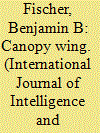

|
|
|
|
|
| Publication |
2014.
|
| Summary/Abstract |
Although Winston Churchill declared that history is always written by the victors, never the vanquished, a group of former East German foreign intelligence officers seem determined to prove him wrong. Calling themselves Insiders have been churning out books since the end of the Cold War that recount the history of that conflict from their perspective. The Insiders' mantra is that they were on the right, even if losing, side because they "spied for peace" to protect the Warsaw Pact against the existential threat posed by the "aggressive intentions" of the West.
|
|
|
|
|
|
|
|
|
|
|
|
|
|
|
|
| 2 |
ID:
147064
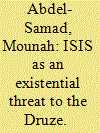

|
|
|
|
|
| Summary/Abstract |
Faced with an existential threat by the Islamic State of Iraq and Syria on one hand, and the repressive regime of Bashar Al-Assad on the other, the Druze community in Syria is faced with a dilemma of what political and military position to take. This study examines a variety of internal and external factors that affect the Druze's political and military choices in Syria, and finds that their best choice is to remain neutral in the conflict. I argue that any political and military choice by the Druze in Syria besides neutrality risks endangering the survival of the entire community. This article examines how internal organizational factors and the international community's divided position play important roles in understanding the Druze's decision to maintain a position of neutrality.
|
|
|
|
|
|
|
|
|
|
|
|
|
|
|
|
| 3 |
ID:
088502
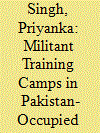

|
|
|
|
|
| Publication |
2009.
|
| Summary/Abstract |
Investigations into Mumbai's 26/11 attack made startling revelations about the militant
training camps in Pakistan-occupied Kashmir (PoK). The Mumbai perpetrators
started from Baitul-Mujahideen in Muzaffarabad, the capital of the so-called 'Azad
Kashmir', and headed for Mumbai via Karachi. They underwent specialized training
in PoK for an extended period before the attack.
Over the years, PoK has become a safe haven not only for terrorists operating in
Kashmir but also for those linked with international terror outfits like Al Qaeda. At
least 55 training camps are said to be located in the region and their cadres number
close to 5,000. The proximity of these camps to Kashmir and the terrain of the region
make infiltration much more convenient especially during summers. Muzaffarabad
and Kotli are known epicentres of such camps and dreaded militant organizations
such as Lashkar-e-Toiba (LeT) and Hizbul Mujahideen have their operational
headquarters there. Terrorist camps are noted to be widespread in Bhimber, Bakryal,
Balakot, Chawari, Kotli, and Mangla. Lashkar has two camps in Muzaffarabad -
Abdul-Bin-Masud and Danna. Hizbul has one in Muzaffarabad and the other in
Mangla. Jaish-e-Mohammed also has a strong foothold in the region even though it
operates chiefly from Balakot (North West Frontier Province).
|
|
|
|
|
|
|
|
|
|
|
|
|
|
|
|
| 4 |
ID:
101269
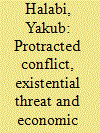

|
|
|
|
|
| Publication |
2010.
|
| Summary/Abstract |
This article argues that a protracted conflict, in general, has strengthened the state vis-à-vis the society in Egypt, Israel, South Korea, Syria and Taiwan. Yet, the existentially threatened states, namely, Israel, South Korea and Taiwan, have pursued economic development and industrialization as a strategic objective. While all three states have been strategically important for the hegemon, the United States, the latter has encouraged them to adopt an export-oriented strategy and opened its own market to their exports. Given the rise in state strength, an existentially threatened state becomes more capable of extracting taxes and mobilizing the society for industrialization. Both Egypt and Syria, in contrast, were merely engaged in a protracted conflict. Consequently, they were not under pressure to maximize their power through industrialization and/or export-led growth strategy, and each explored, in its own unique way, short-cut solutions for regaining its occupied territory.
|
|
|
|
|
|
|
|
|
|
|
|
|
|
|
|
| 5 |
ID:
131009


|
|
|
|
|
| Publication |
2014.
|
| Summary/Abstract |
A recent, notable strain of empirical research argues that postcolonial state-building follows a pattern similar to the European state-building experience. It acknowledges that war is less common today, but contends that interstate rivalry now drives state-building. We argue that postcolonial state-managers have little reason to build state capacity in response to rival states. There is only a slight chance that these rivalries will escalate into an existential threat for the government. Attention should instead be focused on the more tangible threat posed by transnational rebels and postcolonial governments' use of low-scale military force to combat such non-state actors. Using interrupted time series methodology on a sample of 72 countries from 1972 to 2002, we find that postcolonial state military intervention against transnational rebels increases direct taxes (a measure of state penetration) and non-tax revenue (state autonomy) collected by governments, while intervention against rival states reduces direct taxation.
|
|
|
|
|
|
|
|
|
|
|
|
|
|
|
|
| 6 |
ID:
168512
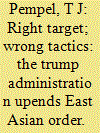

|
|
|
|
|
| Summary/Abstract |
President Donald Trump initiated a tariff war claiming that the ultimate target was mercantile Chinese economic practices. Numerous countries share such concerns about China. Yet the Trump administration’s approach is wrong for at least three big reasons. First, tariffs avoid addressing the most fundamental complaints about China while they undermine the longstanding and beneficial global liberal trade order. Second, the U.S. approach has been unilateral rather than multilateral, weakening America’s bargaining position while alienating close allies. Third, the Trump administration escalates what is an economic challenge into an existential threat, ignoring numerous benefits from Chinese policies as well as ignoring multiple areas where China has been a powerful global partner. Middle powers in Asia have acted collectively and individually to bolster the global trading system and avoid the worst consequences of the Trump actions while seeking to avoid making permanent binary choices between the United States and China. Beyond the immediate problems, the Trump tariff wars are creating, they also generate damaging second order effects that are undermining domestic and regional policies conducive to enhanced American strengths and an economically less mercantilist China.
|
|
|
|
|
|
|
|
|
|
|
|
|
|
|
|
| 7 |
ID:
132446
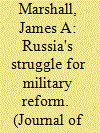

|
|
|
|
|
| Publication |
2014.
|
| Summary/Abstract |
This article assesses the recent attempts to reform the Russian military and the future prospects of successful reform. Despite serious social and economic ailments, Russia should still be able to modernize its military; however the key obstacles to reform lie in its leadership's inability to shape existing resources into military capabilities. First, the article examines the decay in Russia's manpower, defense budgeting, and defense industrial base. Second, the article surveys the security environment in which Russia must tailor these strategic resources. However, the state of these resources and Russia's security needs do not justify the capabilities that the Russian military has developed. Therefore, the article identifies Russia's inability to transform resources into capabilities as the missing link in military reform. Specifically, these poor 'conversion capabilities' include dysfunctional civil-military relations, misguided threat assessment and strategy formulation, and opaque doctrine. Finally, the article concludes that absent any external existential threats or a military disaster, successful military reform is unlikely, with implications for both the threshold at which Russia decides nuclear weapons are necessary as well as its perceived need for strategic depth.
|
|
|
|
|
|
|
|
|
|
|
|
|
|
|
|
| 8 |
ID:
083872
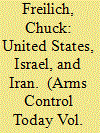

|
|
|
|
|
|
|
|